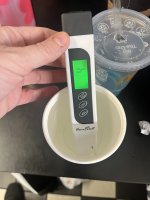The Waterboy
Member
The spot free rinse should be RO WATER ONLY otherwise it will spot. Like Dan said, shoot for less than 30 ppm. I'm willing to bet that they plumbed a soft water line into the spot-free water tank as a backup so that if the RO could not keep up with the demand your tank would not go empty. Empty tank means no final rinse in an automatic and also a burned up delivery pump.@The Waterboy @Dan kamsickas @Greg Pack @Buckeye Hydro
Thank you all!! This information is overwhelming and abundant. But all good things that I certainly need to be successful in my goals.
Another Question, the pass of spot free rinse. Should that be pure RO water only? As it is its mixing with soft water and RO water. Why they would put un treated softwater and mix it with treated RO, doesn't add up to me. The RO discard, drains into the tunnel. Its not collected at all.
That white tank was pure city water, 100% untreated (597TDS). We switched it to softwater (60TDS) only. TDS still higher then my goal, but considerably lower then city water.
How often should Soft water tanks be rebuilt. They tried selling me one, when I had all the water "UPGRADED." I declined. I am doing research on the Fleck9500.
The RO reject water (called concentrate) is most often discarded because it contains all of the dissolved solids that are removed from the product water and therefore isn't very useful for anything. The only exception to this that I have personally seen be successful was using it for tire cleaner in an automatic.
The white tank should be soft water. The goal is everything should be at least soft. Softening water does not change TDS though, so I am a little confused by your 596-60 statement. You need to be testing soft water for hardness, not TDS.
Water softener mineral tanks are rated for 10 years but they only have a 1 year warranty so interpret that however you want. Generally speaking, most of the time you can get about 10-15 years out of one unless it's subjected to extreme elements (hot, cold, UV, etc.). The softener media inside the tanks (called resin) and the distributor need to be replaced every 5-7 years, depending on the quality of the resin and the level of chlorine in your municipal water supply. Testing for soft water regularly is the best way to know if your softener is doing it's job or not. Also old resin can sometimes gel up and cause a pressure drop which can be very problematic.
You shouldn't need to put too much effort into learning about the Fleck 9500 other than how to set it for proper capacity and brine dosage. There is a 5 year maintenance item that is recommended by Fleck which you will more than likely want a water pro to handle for you. The internal seals and spacers need to replaced and the pistons/injector/brine valve all need to be inspected.






